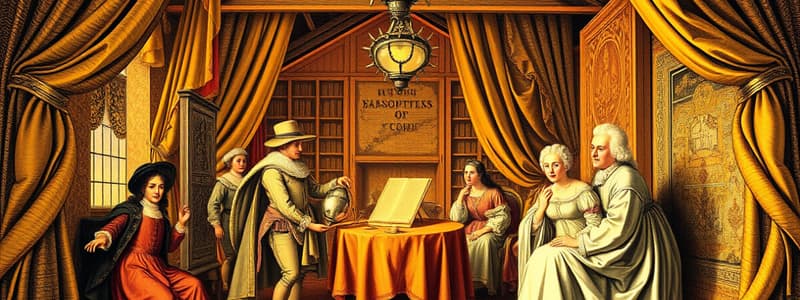Podcast
Questions and Answers
What was a significant characteristic of the High Enlightenment period?
What was a significant characteristic of the High Enlightenment period?
- The emergence of feudalism as a dominant system
- A decline in philosophical discourse and public debate
- The establishment of absolute monarchy throughout Europe
- A rise in anti-religious sentiments alongside religious innovation (correct)
Which philosophical idea did Locke and Bayle advocate for during the Enlightenment?
Which philosophical idea did Locke and Bayle advocate for during the Enlightenment?
- The need for a theocratic government
- Maintaining traditional religious practices to govern morals
- The unity of Church and State as essential for societal order
- Separating Church and State to promote individual freedom (correct)
The French Revolution of 1789 was seen as the culmination of which Enlightenment vision?
The French Revolution of 1789 was seen as the culmination of which Enlightenment vision?
- Reforming the monarchy to retain some traditional aspects
- Overthrowing old authorities to rationally remake society (correct)
- Innovating religious practices for societal improvement
- Preserving old authorities for stability
According to Rousseau, what is the primary reason for mankind's corruption?
According to Rousseau, what is the primary reason for mankind's corruption?
What types of venues emerged during the High Enlightenment for the circulation of ideas?
What types of venues emerged during the High Enlightenment for the circulation of ideas?
What was one of the philosophical challenges posed by Enlightenment thinkers?
What was one of the philosophical challenges posed by Enlightenment thinkers?
Which right was emphasized as particularly valuable in the context of the Enlightenment?
Which right was emphasized as particularly valuable in the context of the Enlightenment?
What did the High Enlightenment thinkers argue about the role of God in the universe?
What did the High Enlightenment thinkers argue about the role of God in the universe?
What synthesis of ideas characterized the Enlightenment period?
What synthesis of ideas characterized the Enlightenment period?
Which movement is said to have paved the way for the Enlightenment?
Which movement is said to have paved the way for the Enlightenment?
What concept did John Locke argue regarding human nature?
What concept did John Locke argue regarding human nature?
What was a significant output of the Enlightenment?
What was a significant output of the Enlightenment?
What role did salons play during the Enlightenment?
What role did salons play during the Enlightenment?
Which of the following best describes the Early Enlightenment?
Which of the following best describes the Early Enlightenment?
How did Isaac Newton contribute to Enlightenment thought?
How did Isaac Newton contribute to Enlightenment thought?
What aspect of humanity was celebrated during the Enlightenment?
What aspect of humanity was celebrated during the Enlightenment?
What principle does Kant establish as the formal basis of Enlightenment?
What principle does Kant establish as the formal basis of Enlightenment?
What critique did Mary Wollstonecraft make about Rousseau's theories in 'Vindication of the Rights of Women'?
What critique did Mary Wollstonecraft make about Rousseau's theories in 'Vindication of the Rights of Women'?
What did Beccaria argue regarding torture and capital punishment?
What did Beccaria argue regarding torture and capital punishment?
Which Enlightenment thinker is associated with promoting the idea of 'one vote, one voice'?
Which Enlightenment thinker is associated with promoting the idea of 'one vote, one voice'?
What aspect did Montesquieu believe was important for the study of political and social behavior?
What aspect did Montesquieu believe was important for the study of political and social behavior?
What is the primary criticism against Rousseau regarding democracy?
What is the primary criticism against Rousseau regarding democracy?
Which concept is NOT associated with Enlightenment thought?
Which concept is NOT associated with Enlightenment thought?
What is the relationship between education and women's abilities, according to Wollstonecraft?
What is the relationship between education and women's abilities, according to Wollstonecraft?
Flashcards are hidden until you start studying
Study Notes
Enlightenment Period Overview
- A significant European intellectual movement during the 17th and 18th centuries.
- Focused on synthesizing ideas about God, reason, nature, and humanity.
- Celebrated reason as a means for understanding the universe and improving human conditions.
Influence on Society
- Resulted in the creation of books, essays, inventions, and scientific discoveries.
- Sparked revolutions and wars.
- Salons and coffeehouses became hubs for intellectual exchange.
Early Enlightenment (1685-1730)
- John Locke's philosophy emphasized human nature as changeable and derived knowledge from experience.
- Isaac Newton's contributions in calculus and optics provided metaphors for change and illumination.
High Enlightenment (1730-1780)
- Encountered religious and anti-religious innovations as Christians repositioned their faith amid emerging materialist arguments.
- Advocated for the separation of Church and State by Locke and Pierre Bayle.
- New venues for idea exchange, such as coffeehouses and newspapers, gained prominence.
Late Enlightenment (1780-1815)
- The French Revolution (1789) characterized the culmination of Enlightenment principles by challenging old authorities.
- The revolution devolved into violence, revealing limitations within Enlightenment ideas.
Key Enlightenment Thinkers and Their Ideas
- Thomas Hobbes: Argued in favor of strong governance; believed in inherent human selfishness.
- John Locke: Emphasized natural rights and the role of government in protecting those rights.
- Montesquieu: Advocated for the separation of powers to prevent tyranny.
- Voltaire: Championed freedom of speech and criticized religious intolerance.
- Jean Jacques Rousseau: Believed man was inherently good; stressed the importance of social contracts.
- Immanuel Kant: Encouraged individuals to think independently and take responsibility for their rationality.
- Mary Wollstonecraft: Advocated for women's rights and education; countered Rousseau's views on women's roles.
- Cesare Beccaria: Opposed torture and capital punishment, arguing for justice and humane treatment.
Contemporary Relevance
- Enlightenment principles shape modern concepts of freedom of thought, equality, and justice.
- Reflection on how these ideas can address current societal issues, especially regarding empowerment and rights.
Studying That Suits You
Use AI to generate personalized quizzes and flashcards to suit your learning preferences.




